Europe does not yet plan to send troops to Ukraine, writes the Economist



The Turkish Foreign Minister noted the term of signing a peace agreement between Armenia and Azerbaijan
The world's largest iceberg continues to collapse
3,800 years of antiquity city (photo) found in Peru
The Russian Foreign Ministry called on Poland to think about the consequences (video)
The suspect in Kirk's murder has been arrested in the United States
Rada offered all citizens to allow Ukraine to leave
Bloomberg. G7 ministers to discuss sanctions against India and China
Poland, Latvia and Lithuania have rejected the invitation to observe Zapd-2025 military exercises
Malaysian Prime Minister stated that Putin, Trump and Chinese prime minister will take part in Asian summit
Minsk stated that Zapad military exercises are held in an organized manner
The Kremlin has announced the termination of direct talks between Russia and Ukraine
Tusk. NATO will inform about the response of an incident in a drone in Poland on September 12
Orban. Von der Layen leads the EU to the abyss
The Globe and Mail. Kirk's murder can radiate Americans
EU Ambassadors agree to extend individual sanctions against Russia for six months
The United Kingdom has imposed sanctions on China, India, Turkey and Thailand
Maduro stated that the ruling party of Venezuela will appeal to the armed struggle against the US aggression
Poland has placed a barbed wire at the border checkpoint with Belarus
The number of victims in Nepal exceeded 50. AFP:
Guardian. Prince Harry has arrived in Kiev